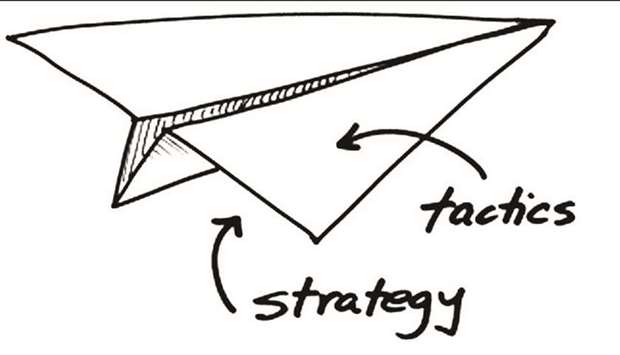We have
all heard the words ‘strategy’ and ‘tactic’ – many of us probably
understand them as interchangeable. When asked though, most struggle to
define the difference between the two.
At its most basic level, strategy is the “what” and tactic is the “how”.
Let’s
start with the “what”. What are you looking to achieve at the top
level? Strategy isn’t always tangible, which is why it’s often skipped
in favour of tactics. The risk with an emphasis on tactics is that it’s
very easy to become fixated on being busy without making certain you’re
doing the right things at the right time.
Equally, teams are far less
likely to be motivated if they don’t know what all their hard work is
supposed to accomplish. Without a clear strategy, people are left to
guess what’s important and what to prioritise, and there is little or no
synergy between different divisions, functions and employees.
It’s
natural then to think that strategy is more important than tactics – but
again, that’s a common mistake. If strategic thinking is about what you
want to accomplish, tactics provide structure to those broad,
aspirational thoughts. A strategy without tactics is a dream, not a
plan.
So how then, do we differentiate effectively between these two misunderstood phrases?
1. Strategy is stable, consistent and long-term
2. Tactics can change regularly and rapidly to achieve your strategy and according to results
3. Strategy and tactics should be aligned and work together
4. If a tactic is not contributing to your overarching strategy, it should be changed
5. You can have multiple tactics simultaneously working to achieve your strategy
For
example, a company may have a low performing product; their strategy
might be to increase exposure and awareness of that product in a
specific region. One of their tactics could be co-ordinating product
roadshows and a series of events where people can experience the
product. If they didn’t see the desired results, their strategy would
still remain the same, but they would try a different approach (tactic).
The strength of your strategy and tactics are critical to the
overall quality and efficiency of your performance and success. Keep
your strategy consistent and ensure everyone in your organisation
understands it. This will enable them to identify the most appropriate
tactics and how they are contributing to achieving the goals of the
organisation.
* S Zuhair Naqvi is the Managing Director of DicoTech Qatar WLL, and an EMBA alumnus of HEC Paris, Class of 2016.

